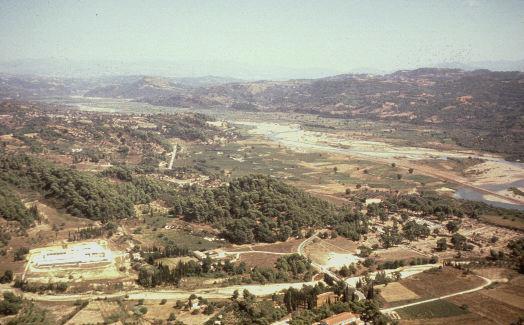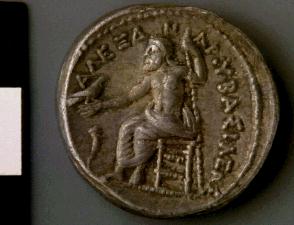





The Olympic truce
A truce (in Greek, ekecheiria, which literally means "holding of hands") was announced before and during each of the Olympic festivals, to allow visitors to travel safely to Olympia. An inscription describing the truce was written on a bronze discus which was displayed at Olympia. During the truce, wars were suspended, armies were prohibited from entering Elis or threatening the Games, and legal disputes and the carrying out of death penalties were forbidden.

Photograph by Raymond V. Schoder, S.J., courtesy of Bolchazy-Carducci Publishers
| Elis is in the northwestern part of the Peloponnese, which is the southern peninsula of mainland Greece. Because it receives more rain, Elis has better forests and pastures than the rest of Greece. The region was respected in ancient times as a holy and neutral place because of the sacred grove to Zeus, called the Altis, at Olympia. |
The Olympic truce was faithfully observed, for the most part, although the historian Thucydides recounts that the Lacedaemonians were banned from participating in the Games, after they attacked a fortress in Lepreum, a town in Elis, during the truce. The Lacedaemonians complained that the truce had not yet been announced at the time of their attack. But the Eleans fined them two thousand minae, two for each soldier, as the law required.
A mina was equivalent to 100 drachmas, and one drachma was an average worker's daily wage, or the price of a sheep. Thus, the fine was a heavy one, equal to 200,000 drachmas.

Reverse: Zeus seated on throne holding eagle and scepter
Photograph by Maria Daniels, courtesy of the Dewing Numismatic Foundation
Another international truce was enforced during the annual Mysteries, a religious rite held at the major sanctuary site of Eleusis. The truces of Olympia and Eleusis not only allowed worshippers and athletes to travel more safely; they also provided a common basis for peace among the Greeks. Lysistrata, the title character in a comic play by Aristophanes, makes this point when she tries to convince the Athenians and the Spartans to end their war.
| In no uncertain terms I must reproach you, both sides, and rightly. Don't you share a cup at common altars, for common gods, like brothers, at the Olympic games, Thermophylai and Delphi? I needn't list the many, many others. The world is full of foreigners you could fight, but it's Greek men and cities you destroy! AristophanesLysistrata , 1131 |
To read more about these topics, see Further Resources.
- The Greek city-states and the religious festival
- Excellence and the competitive spirit
- The Olympic truce
- The ancient athlete: amateur or professional?
- Did politics ever affect the ancient Games?
- Spectators at the Games
- Cultural achievements and the Games
This exhibit is a subset of materials from the Perseus Project database and is copyrighted. Please send us your comments.